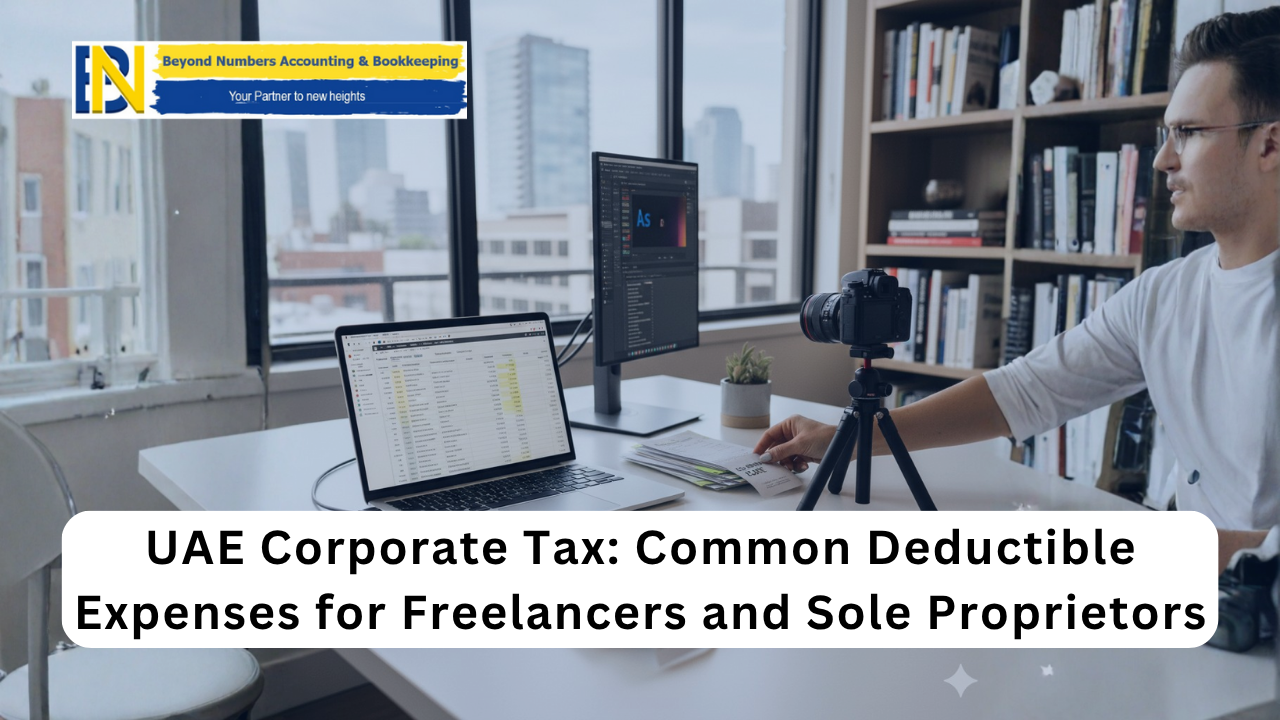For freelancers and sole proprietors (categorized as Natural Persons conducting a business activity) in the UAE, the ability to deduct legitimate business expenses is crucial for accurately calculating taxable income and mitigating potential Corporate Tax (CT) liability. While the tax is levied at 0% on profit up to AED 375,000, you must first accurately determine your profit by subtracting allowable deductible expenses from your gross revenue.
The core principle remains constant across all business structures: an expense is deductible only if it is wholly and exclusively incurred for the purpose of generating the taxable income. For freelancers, whose business and personal spheres often overlap, meticulous apportionment and documentation of deductible expenses are imperative.
Key Categories of Deductible Expenses
Freelancers and sole proprietors can leverage a broad spectrum of deductible expenses that are essential to the daily operation and growth of their professional service or trade. The focus remains on costs that directly facilitate the generation of taxable revenue:
- Operational Costs & Workspace
These deductible expenses are necessary to facilitate the environment in which you deliver your service:
-
- Office Rent and Utilities: If you rent a dedicated commercial space, co-working desk, or managed Free Zone flexi-desk, the costs are fully deductible. If you operate from a home office, you can only deduct a fair and reasonable portion of the rent, utility bills (electricity, water, internet), and maintenance costs corresponding to the area exclusively used for business. Apportionment is key to claiming these deductible expenses legitimately.
- Office Supplies and Consumables: Stationery, printing materials, toner, and other day-to-day office consumables are fully deductible expenses.
- Licenses and Permit Fees: Annual renewal fees for your freelance permit, trade license, and any government registrations are essential business costs and qualify as deductible expenses.
- Professional Development & Tools
Costs that strengthen your ability to perform the service are generally allowable deductible expenses:
-
- Software and Subscriptions: Fees for business-critical software, cloud storage, design tools (e.g., Adobe, accounting software, project management tools), and professional digital subscriptions are deductible expenses.
- Training and Education: Expenses for courses, workshops, and certifications that directly relate to enhancing your professional skills and business capabilities are deductible expenses.
- Professional Fees: Fees paid to external experts such as auditors, tax advisors, bookkeepers, and legal counsel for services rendered in relation to your business are fully deductible expenses.
- Marketing & Client Acquisition
Expenses that drive revenue generation are typically deductible expenses:
-
- Advertising and Promotion: Costs associated with digital marketing campaigns, social media advertising, website maintenance, hosting fees, and promotional materials are deductible expenses.
- Client Entertainment (Limited): Expenses for client meetings, business lunches, and hospitality are only 50% deductible under the CT Law. This stipulation recognises the non-commercial element involved in such activities, and you must ensure proper documentation detailing the business purpose to secure this partial deduction of the deductible expenses.
- Capital Expenditure (Depreciation)
The cost of purchasing long-term assets, such as laptops, cameras, or specialized equipment, is not immediately deductible as a revenue expense. Instead, relief is claimed over the asset’s useful life through depreciation (capital allowance), following accepted accounting standards. These capital allowances represent the portion of the asset’s cost that is an allowable deductible expense in a given year.
Crucial Actionable Considerations for Freelancers
You must recognize that the prevalence of mixed-use expenses (personal and business) for freelancers necessitates robust financial discipline. Failure to adhere to the stringent documentation requirements will result in the disallowance of claimed deductible expenses.
| Consideration Area | Practical Compliance Requirement | Why It Is Imperative |
| Wholly & Exclusively | Every expense claimed must have a clear, demonstrable link to your freelance activity. | Failure to prove the business purpose will lead to the expense being disallowed and may attract penalties; only pure business costs are deductible expenses. |
| Apportionment | If an expense serves a dual purpose (e.g., phone bill), you must use a consistent, fair, and documented method (e.g., usage log, time dedicated) to claim only the business portion as a deductible expense. | Arbitrary estimations will be disallowed; an objective basis for the deduction is essential. |
| Documentation | You are obligated to retain all invoices, receipts, and contracts for a minimum of seven years. | Proper documentation is the single most critical factor for successfully substantiating your deductible expenses during an audit. |
| Owner Compensation | As a sole proprietor, funds withdrawn by the owner are generally treated as drawings of profit, not a deductible salary expense. | You must distinguish between owner’s draws and legitimate business operating expenses to ensure accurate calculation of deductible expenses. |
Conclusion and Next Steps
The ability to leverage these common deductible expenses is fundamental for any freelancer or sole proprietor operating above the AED 1 million revenue threshold (which mandates CT registration). Accurate record-keeping and appropriate apportionment of mixed expenses are not merely administrative tasks; they are a critical juncture in maintaining compliance and accurately determining your 0% or 9% CT liability.

